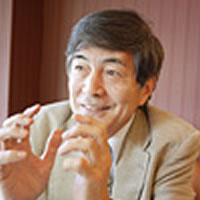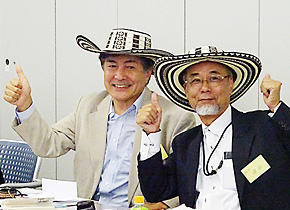The significance of seminars in Japan that look back, together with instructors- PREX Island
Lecturers / Specialists
The significance of seminars in Japan that look back, together with instructors
 |
Ryohei Kada, professor at Shijonawate Gakuen University, and professor emeritus at the Research Institute for Humanity and Nature |
We asked Mr. Kada (professor at Shijonawate Gakuen University and professor emeritus at the Research Institute for Humanity and Nature) to serve as instructor and course leader for the seminar, which aims to “create towns’ treasures” and be “a moving seminar.” From the stance of a Japanese agriculturalist and environmentalist, he provided guidance on such points as the situations of farming village development and natural industrialization in Japan, the securing of human resources and regional development projects, with a view toward Colombia’s regional industries and tourism promotion. After the seminar ended, we asked him his thoughts about its significance.
Participants’ surprise when visiting Japan’s regions
The JICA Seminar for Colombian Government Officials and Private Sector Cooperation in Regional Industrial and Tourism Promotion was implemented in September and October 2015. Seventeen government officials from Colombia learned distinctive case studies in regional promotion from such places as Tottori Prefecture, Tottori City, Chizucho, Takashima City, Koka City, Omihachiman City and Kyoto City. I was happy that my goal, to have “a moving seminar,” was successful when seeing the happy expressions on the participants’ faces after their seminar finished. They met each other for the first time through the seminar. The participants looked a bit worried on the first day. But their expressions gradually became more positive as they saw and explored the distinctive regional initiatives in Tottori Prefecture, Tottori City, Chizucho, Takashima City, Koka City, Omihachiman City and Kyoto City. At the end, their expressions revealed satisfaction and positive impressions.
Regional initiatives that link tradition with modern times
The reason the seminar was a success was, above all, that the initiatives in Japan’s regions that we observed were so fantastic. At first, I sometimes wondered whether there was anything the Colombian participants could learn when they visited Japanese rural districts. But after we actually went to the sites, I myself renewed my own understanding of Japan’s regional strength. One of the key phrases of the regional efforts was, “Linking tradition with modern times.” The various regions integrated the “treasures” remaining there, including history, culture and tradition, generated “wisdom,” and connected it with the “now.” This perspective can be linked to some kind of initiatives, regardless of country or region. They can certainly be incorporated into the activities of the Colombians. The second point is “the role of the local authorities.” In Japan’s regional districts, local governments work in alliance with the private sector, fulfilling their role of drawing out each insufficient part and connecting it. This aspect is weak in developing countries, so it is extremely useful to learn about. I think realistic initiatives associated with various regions in Japan — not just new marketing techniques from the advanced countries — can be extremely useful in the scenarios of industrial formation and regional development in developing countries

Professor Kada and Professor Toshimichi Sawada of Tottori University are presented with caps from Colombia on the seminar’s final day.
“Resonance” from learning bilaterally
The seminars are not “one sided,” whereby the Japanese side teaches the participants, but learn bilaterally. Rather, they have a “resonance.” The Japanese people wonder about the kind of reaction people from overseas will have toward our efforts. So this is an opportunity for them to move their own activities further forward in a positive direction. I believe that is one of the important things about the seminars. They will be continued in the next fiscal year. As a next step, I would like to create an environment that enables more mutual learning and trial and error. I look forward to seeing both sides come up with approaches for solving problems and with insights, with the aim of having a forum of mutual learning by creating synergies, revolving around issues shared by Japanese people and Colombians.
- Date : June 27, 2016
- Name : Mr.Ryohei Kada
- job name : professor


